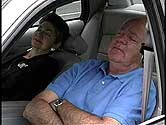

URL of this page: http://www.nlm.nih.gov/medlineplus/news/fullstory_68735.html (*this news item will not be available after 11/28/2008)

 SATURDAY, Aug. 30 (HealthDay News) -- This Labor Day weekend, the Vision Council and National Sleep Foundation are warning people of the dangers of driving with poor vision or while drowsy.
SATURDAY, Aug. 30 (HealthDay News) -- This Labor Day weekend, the Vision Council and National Sleep Foundation are warning people of the dangers of driving with poor vision or while drowsy.
These two rarely recognized driving hazards are just as deadly as poor road conditions and drunk driving.
In a recent survey, Shedding Light on Driving in the Dark, 38 percent of respondents complained of eyestrain, 34 percent of dry or tired eyes, 25 percent of fatigue, and 18 percent of the inability to focus while driving at night. And both the National Highway Traffic Safety Administration (NHTSA) and the National Safety Council cite the fatality rate at night to be three times higher than the daytime rate.
More than 11 million Americans are living with uncorrected vision problems, which can significantly diminish the ability to drive safely.
"We rely on our eyes every time we step into a car; especially our peripheral vision, depth perception, and focusing skills," Ed Greene, CEO of the Vision Council, said in a council news release. "This link between vision and driving makes it essential for motorists to take steps to maintain healthy vision, just as they take other safety precautions on the road."
Another survey, the 2008 Sleep in America Poll, found that 64 percent of drivers who work 30 hours per week or more have driven a vehicle while feeling drowsy in the past year, and 36 percent have actually fallen asleep at the wheel.
Like alcohol, sleepiness can affect vision, slow reaction time, decrease awareness, and increase the risk of crashing. Young people, men, shift workers, commercial drivers and people with untreated sleep disorders are at especially high risk of being involved in sleep-related crashes.
"Most people are aware of the dangers of drinking and driving but are unaware that driving drowsy can be just as fatal," Darrel Drobnich, chief program officer at the National Sleep Foundation, said in a news release from the foundation. "In fact, traffic safety and sleep experts believe that drowsy driving is much more common than even federal statistics indicate."
The Vision Council and National Sleep Foundation recommend the following to enhance your vision and prevent drowsy driving:
Related MedlinePlus Pages:
Date last updated: 02 September 2008